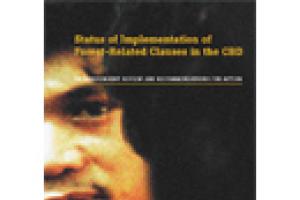In the Planalto forest reserve in Colombia, the 180 species of diurnal butterflies found until today, can go on flying, the ten genuses of Melolonthidae beetle will go on scratching the soil, and also the ants that live there and form part of all the subfamilies in the neotropics will continue their work. The flight of the 160 different species of birds, 9% of the total species identified in Colombia, will continue uninterrupted. All this will be possible thanks to the action of the people living in the reserve area and those who supported their struggle.
Colombia
Other information
18 March 2002
Commissioned by the Global Forest Coalition
This report is based on 21 country case studies, including Australia, Brazil, Cameroon, Canada, Chile, Colombia, Czech republic, Ghana, India, Indonesia, Kenya,Malaysia, the Netherlands, New Zealand/Aotearoa, Papua New Guinea, Russia, South Africa, Suriname, Uganda, United Kingdom, and Uruguay
Bulletin articles
21 January 2002
On 27 December 2001, the Colombian Inter-Congregational Justice and Peace Commission sent the President of the Republic, Doctor Andrés Pastrana Arango and other national authorities a letter in which, among many other things, it reported that during the first twenty days of December, the “Maderas del Darién” company had been logging in a place known as Mendoza, in the perimeter of San Jose de La Balsa, La Balsa, Bocachica, San Higinio, within the Collective Territory of Cacarica.
Bulletin articles
27 November 2001
For some time now we have been addressing the issue of oil palm plantations. But it was in our June 2001 special bulletin --entirely devoted to the subject-- and in the book "The Bitter Fruit of Oil Palm: dispossession and deforestation", that we entered more specifically into the derivations that this large-scale monoculture has on the situation of the workers.
Bulletin articles
27 October 2001
From 1982 onwards, the shrimp industry has been settling in the Cispatá bay, an ecosystem harbouring one of the most exuberant mangroves in the Colombian Caribbean. Presently there are four shrimp industries fully established in this site, covering an extension of approximately 700 hectares. The semi-intensive productive system these farms apply has a daily water recharge in its ponds, reaching an average of up to 15% of its volume, leading to a daily dumping into the estuary of large quantities of water saturated by organic waste.
Bulletin articles
12 June 2001
Oil palm was introduced in Colombia in 1932, but its commercial development started by the end of the fifties. In the mid sixties there were over 18,000 hectares of that crop in the provinces of César, Magdalena, Santander and Norte de Santander. Palm cultivation expanded to other provinces and according to data published in 1995 by Fedepalma, by that year there were already around 130,000 hectares, being the country's main oil crop, mainly in the north, central and eastern zones of the country.
Bulletin articles
12 March 2001
The Chocó Biogeographical Region comprises an area of some 75,000 square kilometres on the Pacific Coast of Colombia, spreading from Panamá to Ecuador. Due to a combination of evolutionary, ecological, climatic and geologic factors, this region presents the highest biodiversity concentration per area in the world. Between 7,000 and 8,000 out of the 45,000 species registered in Colombia are found in the Chocó. Endemic plant species are more than 2,000 while endemic birds comprise more than 100 species, which represent the highest endemism levels in the Planet.
Bulletin articles
13 February 2001
Private commercial tree plantations began to be implemented in Colombia in the 1960s. Long-fibre wood commercial plantations --pine and cypress-- are mostly located in the West of the country, in the Departments of Antioquía, Caldas, Quindio, Risaralda, Valle and Cauca, while in the central zone --in the Departments of Cundinamarca and Boyacá-- there is a dominance of Eucalyptus globulus.
Bulletin articles
13 January 2001
The Urrá Dam megaproject on the Sinú River in the Department of Córdoba, in the Colombian Atlantic region, constitutes a worldwide known environmental catastrophe as well as a complete disaster to the local people. The dam built by the company Urrá and openly supported by the Colombian government --which considers the project vital for the country's economy-- will flood more than 7,000 hectares of forests and directly affect the livelihoods and the very existence of the Embera Katío indigenous people and the fisherfolk communities of the area.
Bulletin articles
16 September 2000
The U'wa indigenous people are maintaining a long conflict with the Colombian state and the oil company Occidental Petroleum in the defense of their traditional territories. The permit granted to the company and the beginning of the works of oil prospection at the Bloque Samoré, located in the premontane forest region along the border between Colombia and Venezuela, constitutes a threat por the U'wa's life and environment. To the U'wa culture, oil is Mother Earth's blood, and to drill it would be a desecration.
Other information
17 July 2000
Fundación Beteguma is a Colombian NGO, with headquarters in Quibdó at the Pacific coast region, which seeks to promote the social, cultural and environmental development of the Biogeographic Chocó through activities of research, conservation and sustainable production involving local communities. The Chocó is one of the few biodiversity hotspots in the world and is suffering a process of environmental degradation because of illegal logging and mining, as well as abuses to human rights.
Bulletin articles
18 June 2000
Aerial spraying to control and eradicate illegal crops in Colombia are creating severe problems to rural communities and forests, similar to those provoked by the crops themselves and by the chemicals used in drug production.
Coca and poppy crops in Colombia have increased in forests despite the eradication policy that began to be applied against marihuana cultivation in 1978. In 1980 an operation to combat marihuana crops at Guajira and the aerial spraying with glyphosate resulted in the worst ecological and sanitary disaster ever experienced in the region.

